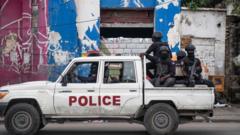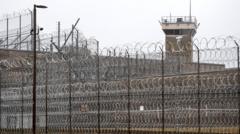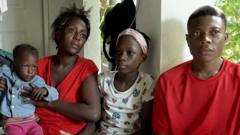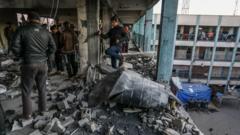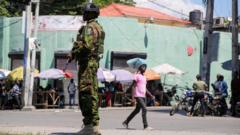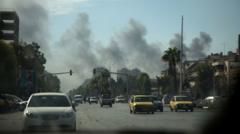As gang violence escalates in Haiti, families like Venda's are caught in a desperate struggle for survival, amid acute malnutrition and a failing economy. The Kenyan-led security mission faces overwhelming challenges in restoring stability, while numerous children are being recruited into gangs exacerbating the crisis.
Haiti's Humanitarian Crisis: Families Struggling Amid Gang Violence and Famine
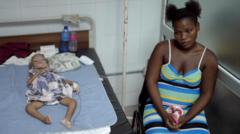
Haiti's Humanitarian Crisis: Families Struggling Amid Gang Violence and Famine
The rising tide of gang violence in Haiti has compounded the humanitarian crisis, leaving countless families in dire situations, while international forces struggle to restore order.
In the heart of Haiti's capital, Port-au-Prince, families are suffering the devastating effects of rampant gang violence and famine. Venda, a mother of two-year-old Shaina, finds herself in one of the few remaining functioning hospitals, hopeful that intravenous treatment will save her emaciated daughter from acute malnutrition. Shaina is one of approximately 760,000 children at risk of famine in a country that seems to be spiraling further into chaos.
Gang warfare has become a pervasive threat since the assassination of President Jovenel Moïse in 2021, with reports indicating that around 85% of Port-au-Prince is currently under gang control. Desperate for help, Venda had feared leaving her home due to the violence raging in her neighborhood. Now inside the hospital, she hopes it’s not too late to save her child. "I want to get proper care for my child; I don't want to lose her," she expresses through tears, embodying the struggles of countless families.
The UN has reported a staggering death toll from gang conflicts in Haiti, with 5,000 fatalities in just the current year. Even hospitals are not immune, having previously witnessed clashes between police and gang members within their emergency wards, causing panic among patients. Amidst this turmoil, young men like Pierre are falling victim to stray bullets as they walk home, underscoring the indiscriminate nature of the violence. "If the government were more stable and had put in place better youth programs, they would not get involved in the gangs," he reflects, hinting at the socioeconomic roots of the crisis.
In response to this escalating violence, the UN Security Council authorized a Multinational Security Support Mission (MSS) in October 2023, with a Kenyan-led force deployed to restore order. However, challenges abound. Despite the presence of 400 officers since June, they remain vastly outnumbered by the estimated 12,000 armed gang members operating in Haiti. The dire situation is palpable: deserted streets, abandoned shops, and makeshift barricades built by gangs underscore the chaos that has engulfed the capital.
While the Kenyan officers patrol in armored personnel carriers, encounters with gang violence are almost inevitable. During a recent patrol, gunfire erupted between the convoy and gangs, leading to a harrowing exchange. Meanwhile, evidence of brutality lies in the streets, such as a charred body—a grim warning sent by rival gangs. Although experiencing fatigue from constant exposure to violence, the Kenyan forces express a commitment to their mission, with Commander Godfrey Otunge indicating “overwhelming support” from local communities for their presence.
The situation for civilians continues to deteriorate. In places historically governed by gangs, such as Wharf Jérémie, civilians suffer oppressive violence resulting in mass casualties. UNICEF reports a 70% increase in children recruited into gangs within a year, underscoring the grim reality for youth in Haiti. Gang leaders, like Ti Lapli of the Gran Ravine gang, exploit economic despair while dispassionately justifying their violence as a mere reflection of what they endure.
“We are living on trash; it’s basically a failed state,” Ti Lapli states, deflecting blame for the poverty his gang perpetuates. The dire economic conditions only serve to deepen the cycle of violence and exploitation. Around 700,000 residents have been forced from their homes due to gang conflicts, leaving schools as makeshift shelters for the displaced, adding to the growing humanitarian disaster.
Negociant, a refugee from her own home, echoes the despair shared by many: "Today, again, I'm on the run to save my life and my children," she asserts as she and her five children cling to their small space in a school balcony. The relentless struggle against gang violence and the crippling famine looms large over the hopes of Haitian families, challenging both local and international efforts to restore stability and peace.


